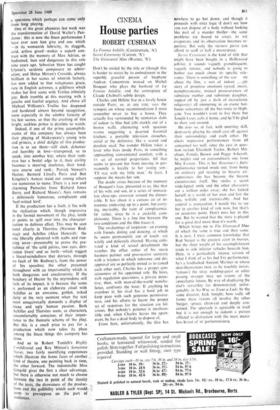CINEMA
House parties
ROBERT CUSHMAN La Femme Infidele (Continentale, 'A') Secret Ceremony (Curzon, 'X') The Illustrated Man (Warner, 'X')
Don't be misled by the title or (though this is harder to resist) by its embodiment in the
superbly graceful person of Stephane Audran. Concentrate instead on Michel Bouquet who plays the husband of La Femme Infidele, and the centrepiece of Claude Chabrol's subtle design.
Charles and Helene live in a lovely house outside Paris; so, at any rate, says the
synopsis on whose recommendation 1 must remember never to buy a house. They actually live surrounded by stentorian slabs of colour (a blue bed jabs starkly out of a brown wall), alternating with spacious wastes suggesting a deserted baronial kitchen; a portable television crouches, aerial at the defensive, like a scared and desolate snail. No wonder Helene takes a
lover who lives inside Paris, in something approaching conventional comfort, with a TV set of normal proportions. All that seems to prevent her from moving in per- manently is loyalty to her young son: 'I'll stay with my little man.' At least, I suppose she means her son.
The doubt arises because of the memory of Bouquet's face, presented to us, like that of his wife and son, in a series of immacu- late close-ups, cross-cut around the dinner- table. It has about it a curious air of in- nocence, endearing up to a point, but carry- ing, inevitably, the taint of complacency. Or rather, since he is a cuckold, com- plaisance. There is a fine line between the two conditions and the film traces it.
The awakenings of suspicion--an evening with friends, dining and dancing, at which he seems permanently out of touch—are wittily and delicately charted. Having culti- vated a kind of sexual detachment (he watches the office antics of his suave business partner and provocative secretary with a wryness in which tolerance and dis- approval are so perfectly mixed as to cancel each other out), Charles has a proper con- sciousness of his appointed role. He hires, with regulation queasiness, a private detec- tive; then, with man-of-the-world noncha- lance, confronts the lover. If anything he overdoes it; his rival has a hard job to keep pace with such generous permissive- ness, and his efforts to locate the proper set of responses for the situation are hil- arious. But nobody's patience is inexhaus- tible and, when Charles leaves the apart- ment, he has a dead body to dispose of. From here, unfortunately, the film has nowhere to go but down, and though it proceeds with strict logic (I don't see how you can dispose of a body without looking like part of a murder thriller—the same problems are bound to arise), its wit evaporates and its observation becomes re- petitive. But only the sternest purist can afford to scoff at half a masterpiece.
Secret Ceremony is the kind of title that might have been bought in a Hollywood job-lot; it sounds vaguely grandiloquent, vaguely sinister, and nobody is going to bother too much about its specific rele-
vance. There is something of the saw me about the film, a sort of indoor ,....gle story of primitive emotions (greed, incest. nymphetomania, mutual possessiveness of substitute mother and substitute daughter, topped off by just a dash of masochistic religiosity) all simmering in an exotic hot- house somewhere off the bus route to High- gate. You wouldn't want to live there but Joseph Losey calls it home, and he'll be glad to show you around.
He does so, in fact, with unerring skill, dextrously playing his small cast off against their surroundings and each other. He elicits impressive performances from all concerned (as well, since the cast in ques- tion include Elizabeth Taylor, Robert Mit- chum, Pamela Brown and Peggy Ashcroft, he might) and an extraordinary one from Mia Farrow. This is her Rosemary's Baby performance turned inside out; from being an ordinary girl reacting to bizarre cir- cumstances she has become the bizarre circumstance itself. She smiles a secret wide-lipped smile and the other characters are a million miles away; she has locked herself in a world of her own and lost the key, wilfully and irretrievably. And her control is immaculate. I would like to see her in another kind of role now, but that's an academic point. Don't miss her in this one. But he warned that the story is played for a good deal more than it's worth.
Which brings me to The Illustrated Man of which the same is true and then some. It is now, I trust, common knowledge that Rod Steiger is the greatest actor in movies, but the sheer weight of his accomplishment tends to sink inferior vehicles beneath him. Here, in a particularly intense version of what I think of as his Jud Fry performance, he's a landlocked Ancient Mariner in whose skin-illustrations (not, as he touchily insists, 'tattoos') the stray wedding-guest or other passing stranger may see visions of the apocalyptic future. By way of displaying the star's versatility (as demonstrated, unfor- gettably, in No Way to Treat a Lady by the same director, Jack Smight, here sadly off form) these visions all involve the other Steiger, spruce, clean-cut and deeply con- cerned. The spectacle is agreeable in itself but it is not enough to redeem a picture afflicted to distraction with the most merci- less brand of SF portentousness.


































 Previous page
Previous page